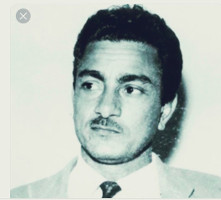Top Qs
Timeline
Chat
Perspective
Riaz Shahid
Pakistani film director (1927–1972) From Wikipedia, the free encyclopedia
Remove ads
Riaz Shahid (1927 – 1 October 1972) was a Pakistani filmmaker, film writer, and a journalist.
Influenced by poet Habib Jalib, who would later become a friend, Shahid frequently engaged with political activists at socialist gatherings in Lahore, and his support for the Pan-Islamic causes of Palestine, Algeria, and Kashmir would be reflected in his filmography.[2]
Remove ads
Early life and education
Riaz Shahid was born in 1927 in Quetta, British India. He belonged to an ethnic Kashmiri family.[3] He was the father of a famous Pakistani film star Shaan Shahid. Shaan was only one year old, when his father died.[4] His real name was Sheikh Riaz, but was called by his nickname Shahid. He was educated at Islamia College, Lahore, Pakistan.[4][5]
Writing career
Riaz lived in Lahore where he started his career as a journalist for the newspaper Chataan and later joined Faiz Ahmed Faiz's Lail-o-Nihar.[4][5][6]
He authored the Urdu novel Hazaar Dastaan (A Thousand Tales) in 1955, a social realist narrative set in post-Partition Lahore, addressing themes of poverty, inequality, and political disillusionment.[4][5] After reading the novel, Faiz Ahmed Faiz convinced him to work in films.[6] Though largely forgotten for decades, the novel was rediscovered and republished in 2024 by a group of literary scholars and activists, sparking renewed interest in Shahid’s contributions to literature.[6]
Remove ads
Film career
Riaz Shahid was introduced as a story and dialogue writer to the Pakistani film industry by his friend, actor Allauddin, in film Bharosa (1958).[5] In 1962, Riaz started his film career as a director for the film Susral (1962). Collaborating with the noted progressive poet, Habib Jalib, he went on to write or direct several films like Zarqa (1969), Shaheed (1962), Farangi (1964), Khamosh Raho (1964) and Yeh Aman (1971).[4][5]
Riaz Shahid was married to then famous actress Neelo and had three children. The first child was a daughter and was named Zarqa followed by two sons Shaan, who is now a well-known Pakistani film actor and Sarosh, who also worked in a couple of Pakistani movies.[4][5]
Death and legacy
Riaz Shahid died of leukemia on 1 October 1972 at Lahore, Pakistan.[4][5]
A noted Pakistani film actress and director Sangeeta is quoted as saying, "Riaz Shahid was a visionary. Whatever is happening in Kashmir today, he showed it well in the 60s. He was the top director of his period and we should be proud that such people were once a part of our industry".[4]
Another film producer Choudhry Ejaz Kamran reportedly said, "Riaz Shahid stood out for not just his craft but his contribution to meaningful cinema. Cinema that was both political and imppressive. Shahid directed super hit films that are now considered guide books for upcoming film-makers. While he dabbed into a variety of genres, he always preferred to do films based on serious and revolutionary ideas".[4]
Remove ads
Filmography
Remove ads
Awards and recognition
Nigar Awards
Best Script Writer
Best Dialogues/Screenplay
Best Director
- Zarqa (1969)
References
External links
Wikiwand - on
Seamless Wikipedia browsing. On steroids.
Remove ads

